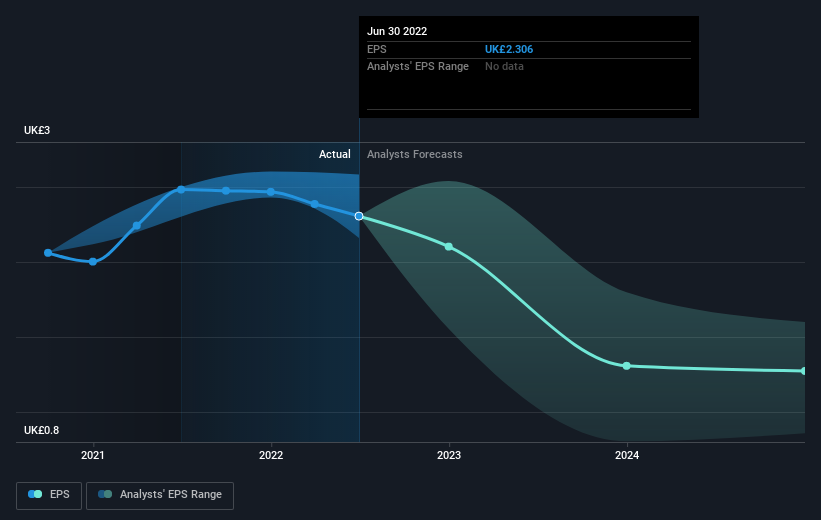[ad_1]
Even the best stock pickers will make plenty of bad investments. And there’s no doubt that Persimmon Plc (LON:PSN) stock has had a really bad year. In that relatively short period, the share price has plunged 56%. Even if you look out three years, the returns are still disappointing, with the share price down54% in that time. Furthermore, it’s down 15% in about a quarter. That’s not much fun for holders.
With the stock having lost 5.4% in the past week, it’s worth taking a look at business performance and seeing if there’s any red flags.
View our latest analysis for Persimmon
While markets are a powerful pricing mechanism, share prices reflect investor sentiment, not just underlying business performance. One imperfect but simple way to consider how the market perception of a company has shifted is to compare the change in the earnings per share (EPS) with the share price movement.
Unhappily, Persimmon had to report a 7.1% decline in EPS over the last year. This reduction in EPS is not as bad as the 56% share price fall. Unsurprisingly, given the lack of EPS growth, the market seems to be more cautious about the stock. The less favorable sentiment is reflected in its current P/E ratio of 5.26.
The company’s earnings per share (over time) is depicted in the image below (click to see the exact numbers).

It’s probably worth noting we’ve seen significant insider buying in the last quarter, which we consider a positive. That said, we think earnings and revenue growth trends are even more important factors to consider. Before buying or selling a stock, we always recommend a close examination of historic growth trends, available here..
What About Dividends?
It is important to consider the total shareholder return, as well as the share price return, for any given stock. The TSR is a return calculation that accounts for the value of cash dividends (assuming that any dividend received was reinvested) and the calculated value of any discounted capital raisings and spin-offs. It’s fair to say that the TSR gives a more complete picture for stocks that pay a dividend. As it happens, Persimmon’s TSR for the last 1 year was -51%, which exceeds the share price return mentioned earlier. And there’s no prize for guessing that the dividend payments largely explain the divergence!
A Different Perspective
We regret to report that Persimmon shareholders are down 51% for the year (even including dividends). Unfortunately, that’s worse than the broader market decline of 5.7%. Having said that, it’s inevitable that some stocks will be oversold in a falling market. The key is to keep your eyes on the fundamental developments. Regrettably, last year’s performance caps off a bad run, with the shareholders facing a total loss of 6% per year over five years. We realise that Baron Rothschild has said investors should “buy when there is blood on the streets”, but we caution that investors should first be sure they are buying a high quality business. It’s always interesting to track share price performance over the longer term. But to understand Persimmon better, we need to consider many other factors. Take risks, for example – Persimmon has 3 warning signs we think you should be aware of.
Persimmon is not the only stock insiders are buying. So take a peek at this free list of growing companies with insider buying.
Please note, the market returns quoted in this article reflect the market weighted average returns of stocks that currently trade on GB exchanges.
Valuation is complex, but we’re helping make it simple.
Find out whether Persimmon is potentially over or undervalued by checking out our comprehensive analysis, which includes fair value estimates, risks and warnings, dividends, insider transactions and financial health.
View the Free Analysis
Have feedback on this article? Concerned about the content? Get in touch with us directly. Alternatively, email editorial-team (at) simplywallst.com.
This article by Simply Wall St is general in nature. We provide commentary based on historical data and analyst forecasts only using an unbiased methodology and our articles are not intended to be financial advice. It does not constitute a recommendation to buy or sell any stock, and does not take account of your objectives, or your financial situation. We aim to bring you long-term focused analysis driven by fundamental data. Note that our analysis may not factor in the latest price-sensitive company announcements or qualitative material. Simply Wall St has no position in any stocks mentioned.
[ad_2]
Source link








